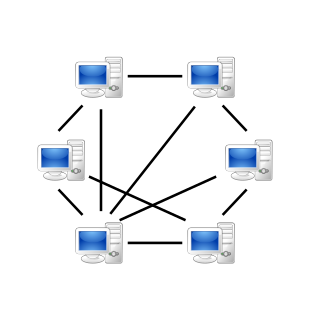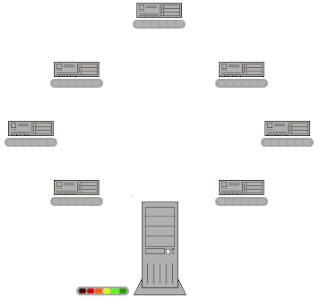Gnutella is a large peer-to-peer network. It was the first decentralized peer-to-peer network of its kind, leading to other, later networks adopting the model. It celebrated two decades of existence on March 14, 2020, and has a user base in the millions for peer-to-peer file sharing.
LimeWire is a discontinued free software peer-to-peer file sharing (P2P) client for Windows, OS X, Linux and Solaris. LimeWire uses the gnutella network as well as the BitTorrent protocol. A zero-cost version and a purchasable "enhanced" version were available; LimeWire Pro could be acquired through the regular LimeWire software without payment, as users distributed it through the software without authorisation. BitTorrent support is provided by libtorrent.

Peer-to-peer (P2P) computing or networking is a distributed application architecture that partitions tasks or workloads between peers. Peers are equally privileged, equipotent participants in the application. They are said to form a peer-to-peer network of nodes.

Shareaza is a peer-to-peer file sharing client running under Microsoft Windows which supports the gnutella, Gnutella2 (G2), eDonkey, BitTorrent, FTP, HTTP and HTTPS network protocols and handles magnet links, ed2k links, and the now deprecated gnutella and Piolet links. It is available in 30 languages.
giFT Internet File Transfer (giFT) was a computer software daemon that allows several file sharing protocols to be used with a simple client having a graphical user interface (GUI). The client dynamically loads plugins implementing the protocols, as they are required.

BitTorrent is a communication protocol for peer-to-peer file sharing (P2P), which enables users to distribute data and electronic files over the Internet in a decentralized manner.
MLDonkey is an open-source, multi-protocol, peer-to-peer file sharing application that runs as a back-end server application on many platforms. It can be controlled through a user interface provided by one of many separate front-ends, including a Web interface, telnet interface and over a dozen native client programs.

gtk-gnutella is a peer-to-peer file sharing application which runs on the gnutella network. gtk-gnutella uses the GTK+ toolkit for its graphical user interface. Released under the GNU General Public License, gtk-gnutella is free software.
Gnutella2, often referred to as G2, is a peer-to-peer protocol developed mainly by Michael Stokes and released in 2002.
Query flooding is a method to search for a resource on a peer-to-peer network. It is simple and scales very poorly and thus is rarely used. Early versions of the Gnutella protocol operated by query flooding; newer versions use more efficient search algorithms.
Kademlia is a distributed hash table for decentralized peer-to-peer computer networks designed by Petar Maymounkov and David Mazières in 2002. It specifies the structure of the network and the exchange of information through node lookups. Kademlia nodes communicate among themselves using UDP. A virtual or overlay network is formed by the participant nodes. Each node is identified by a number or node ID. The node ID serves not only as identification, but the Kademlia algorithm uses the node ID to locate values. In fact, the node ID provides a direct map to file hashes and that node stores information on where to obtain the file or resource.

Magnet is a URI scheme that defines the format of magnet links, a de facto standard for identifying files (URN) by their content, via cryptographic hash value rather than by their location.
The eDonkey Network is a decentralized, mostly server-based, peer-to-peer file sharing network created in 2000 by US developers Jed McCaleb and Sam Yagan that is best suited to share big files among users, and to provide long term availability of files. Like most sharing networks, it is decentralized, as there is no central hub for the network; also, files are not stored on a central server but are exchanged directly between users based on the peer-to-peer principle.

FrostWire is a free and open-source BitTorrent client first released in September 2004, as a fork of LimeWire. It was initially very similar to LimeWire in appearance and functionality, but over time developers added more features, including support for the BitTorrent protocol. In version 5, support for the Gnutella network was dropped entirely, and FrostWire became a BitTorrent-only client.
File sharing is a method of distributing electronically stored information such as computer programs and digital media. Below is a list of file sharing applications, most of them make use of peer-to-peer file sharing technologies.
Peer exchange or PEX is a communications protocol that augments the BitTorrent file sharing protocol. It allows a group of users that are collaborating to share a given file to do so more swiftly and efficiently.
Peer-to-peer file sharing (P2P) systems like Gnutella, KaZaA, and eDonkey/eMule, have become extremely popular in recent years, with the estimated user population in the millions. An academic research paper analyzed Gnutella and eMule protocols and found weaknesses in the protocol; many of the issues found in these networks are fundamental and probably common on other P2P networks. Users of file sharing networks, such as eMule and Gnutella, are subject to monitoring of their activity. Clients may be tracked by IP address, DNS name, software version they use, files they share, queries they initiate, and queries they answer to. Clients may also share their private files to the network without notice due to inappropriate settings.

Phex is a peer-to-peer file sharing client for the gnutella network, released under the terms of the GNU General Public License, so Phex is free software. Phex is based on Java SE 5.0 or later.
In the BitTorrent file distribution system, a torrent file or meta-info file is a computer file that contains metadata about files and folders to be distributed, and usually also a list of the network locations of trackers, which are computers that help participants in the system find each other and form efficient distribution groups called swarms. A torrent file does not contain the content to be distributed; it only contains information about those files, such as their names, folder structure, and sizes obtained via cryptographic hash values for verifying file integrity. The term torrent may refer either to the metadata file or to the files downloaded, depending on the context.





